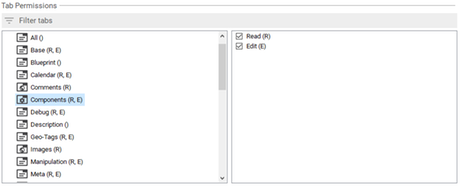Audio Sequences
For this field type, you should select sophora-extension-nt:audiodata as valid child node type.
CSV
In a CSV input field, a user can select a CSV (comma separated values) file from his file system. The information loaded from the file is then displayed in a table and can be edited there.
Document References
A field to reference documents other than images (see Image References). By that, the user can also overwrite properties that are defined in the according document reference type, within the Component Details view. This field type is designed for a more general use case which allows you to replace other properties than those of an image document.
Image References
This field type allows you to reference an image document. By that, the user can also overwrite certain properties (as defined in the according image reference type) within the Component Details view, because the image document is handled as a component.
Follow-Ups
This field type allows the user to specify a follow-up date. Therefore, the node type sophora-nt:followup is required.
Form Fields
This input field type generates a table of abstract form fields. In order to use this field, sophora-extension-nt:formfields should be configured as valid child node type. The form fields are defined as properties of the childnode which is assigned here (the childnode that is associated with this input field type). For an individual realisation, it is recommended to use form fields in combination with a dynamic table.
Icon
This field type is used for icons. The icons must be in one of the formats JPEG, GIF, PNG or SVG and must have a size of 24x24 px (except SVG files, which are automatically scaled to the appropriate resolution). As valid child node, it should only be assigned the type sophora-nt:binarydata.
Survey Responses
This field type represents survey responses as a table. In order to use this field, sophora-extension-nt:pollchoice should be configured as valid child node type. For an individual realisation, it is recommended to use survey responses in combination with a dynamic table.
Time Scheduling
With this input field, users can configure timing actions on document level, such as Days until offline or customised timing events triggered by scripts. This field type requires the node type sophora-nt:timingConfig. You can find an exemplary input field of this type on the Configuration tab within a structure node editor. You can find more information about the time scheduling of documents here.
Word List
An input field type to manage a large list of words, for example as it appears in dictionaries. Each line in the field represents a unique word list entry. To use the field, a single valid child node type must be configured. The configuration of this node type must contain exactly one multi-string property that will be used for storage. We recommend using sophora-nt:wordContainer as the valid child node type.
Channel Settings
The Channel Settings field type allows the user to edit settings related to playout channels. It allows to specify in which playout channels a document should be visible, and at what times.
This field must be configured on the child node named sophora:channelSettings and must have sophora-nt:channelSettings as the only valid child node type.
System Permissions
This field type allows to edit the system permissions of a role document. It can also be used for other child nodes, but the saved child nodes will have the type sophora-nt:systemPermissions.
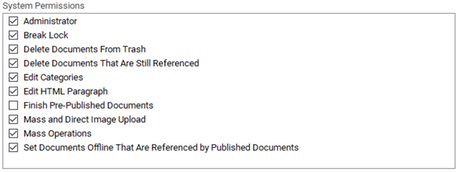
Document Type Permissions
This field type allows to edit the document type permissions of a role document. It can also be used for other child nodes, but the saved child nodes will have the type sophora-nt:documentPermissions. The user can select a set of permissions for each node type. A context menu allows to set or remove all permissions at once.
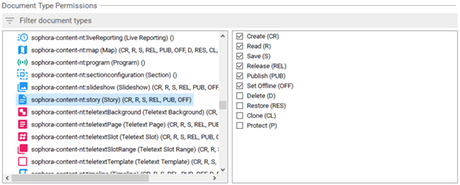
Structure Node Permissions
This field type allows to edit the structure node permissions of a role document. It can also be used for other child nodes, but the saved child nodes will have the type sophora-nt:structureNodePermissions. The user can select a set of permissions for each structure node. A context menu allows to apply or remove all permissions of the currently selected node at once. Additionally, the context menu shows options to apply the same set of permissions to all of the node's children, or to remove all permissions of all its children.
This field stores only the top structure node with a given permission, so that all child structure nodes (incl. newly added) can inherit that permission (granted or denied).
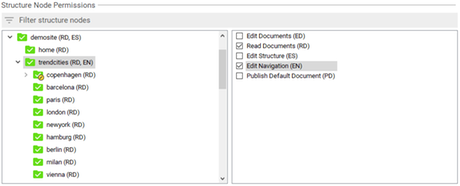
Proposal Section Permissions
This field type allows to edit the proposal section permissions of a role document. It can also be used for other child nodes, but the saved child nodes will have the type sophora-nt:proposalSectionPermissions. The user can select a set of permissions for each proposal section. A context menu allows to set or remove all permission at once.
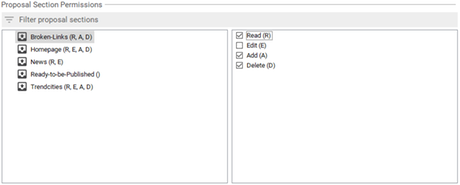
Tab Permissions
This field type allows to edit the tab permissions of a role document. It can also be used for other child nodes, but the saved child nodes will have the type sophora-nt:tabPermissions. The user can select a set of permissions for each tab. A context menu allows to set or remove all permission at once.
